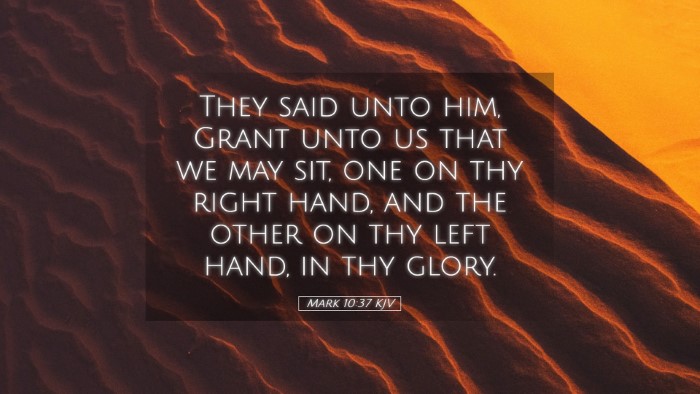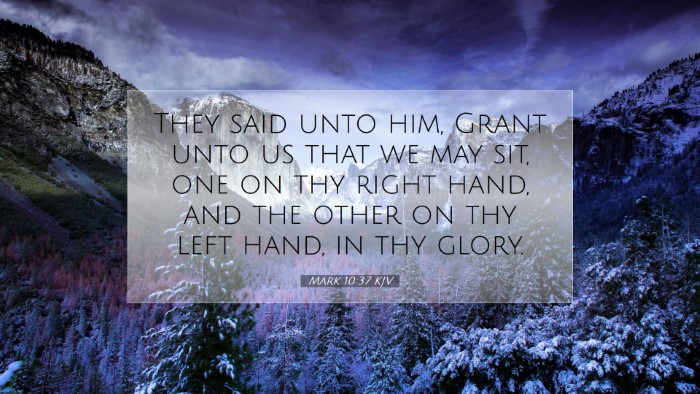Commentary on Mark 10:37
Verse Text: “They said to Him, ‘Grant us to sit, one at Your right hand and one at Your left, in Your glory.’” (Mark 10:37, ESV)
Introduction
The request made by James and John in Mark 10:37 reflects a common human desire for power, prominence, and honor. This passage offers profound insights into the nature of ambition and the true meaning of greatness in the Kingdom of God. The public domain commentaries by Matthew Henry, Albert Barnes, and Adam Clarke provide valuable perspectives that can enrich our understanding of this scripture.
Contextual Analysis
In the context of Mark 10, this request follows Jesus’ prediction of His suffering and death. This juxtaposition reveals the disciples’ misunderstanding regarding the nature of Jesus’ mission and the kingdom He was establishing. As Jesus prepares to face the crucifixion, the disciples are preoccupied with their own aspirations.
Matthew Henry's Perspective
Matthew Henry points out the misplaced ambition of the disciples, noting that their request for positions of honor reveals a lack of understanding of the suffering that accompanies true discipleship. He comments on the desire for glory without the corresponding willingness to bear the cross, emphasizing that Christ’s glory is rooted in humility and sacrifice.
- Ambition vs. Servanthood: Henry contrasts worldly ambition with the call to servanthood. He argues that true greatness in the eyes of God is found in serving others rather than seeking to be served.
- Misunderstanding of Jesus' Mission: He highlights that the request arises from a misunderstanding of Christ’s mission, wherein the disciples were focused on earthly glory rather than the spiritual kingdom.
Albert Barnes' Interpretation
Albert Barnes provides insight into the implications of the disciples' request for authority and recognition. He underscores the significance of the positions they sought, illustrating how they reflect a desire for prominence that contrasts sharply with Christ's forthcoming suffering.
- Position of Authority: Barnes notes that the request indicates their belief that Jesus was about to establish an earthly kingdom, reinforcing their misunderstanding of His mission. He emphasizes how this ambition can lead to conflict and division among His followers.
- Jesus' Response: The response of Jesus serves as a crucial teaching moment, highlighting the nature of true discipleship, which involves humility and a willingness to share in both suffering and glory.
Adam Clarke's Contributions
Adam Clarke provides a rich analysis of the implications of this request within the broader narrative of Jesus' teaching about humility and service. Clarke notes the audacity of James and John, considering the severity of Jesus’ impending trials.
- Theology of Glory vs. the Theology of the Cross: Clarke identifies the tension between seeking glory and embracing the cross, noting that Jesus’ path to glory would involve suffering, which the disciples failed to grasp.
- Call to Discipleship: He emphasizes that Jesus’ followers are called to reorient their perspectives towards a life characterized by self-denial and service, contrasting the culture of self-promotion with the ethos of the Kingdom.
Theological Implications
Mark 10:37 challenges readers to confront their own motives and desires for recognition in ministry and service. In examining this passage, several theological implications arise:
- Redefining Greatness: Jesus offers a radical redefinition of greatness, indicating that those who desire to be first must become last and serve others (Mark 10:43-44).
- The Cost of Discipleship: The request of James and John speaks to the understanding that following Christ requires a willingness to endure trials and hardships alongside Him.
- Participation in Christ's Mission: The call to positions of honor in the Kingdom comes with the responsibility to live in accordance with Christ’s example of service and sacrifice.
Conclusion
Mark 10:37 serves as a profound teaching moment that invites believers to reflect on their ambitions in light of Christ’s example. The insights from Matthew Henry, Albert Barnes, and Adam Clarke remind us that true greatness in the Kingdom of God is not defined by our positions or recognition but by our willingness to serve and to participate in the sufferings of Christ. As we strive to embody this ethos, may we look to Christ as our ultimate example and foundation for true glory.


